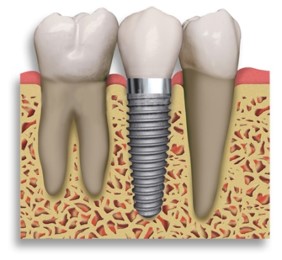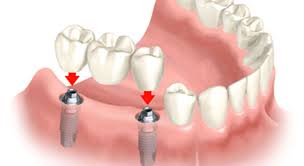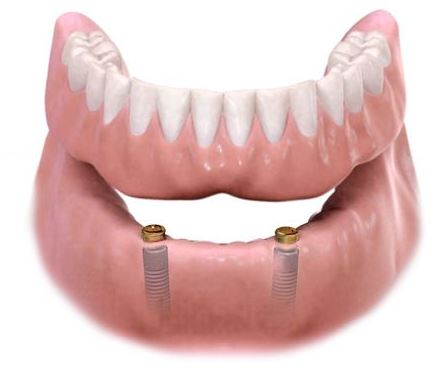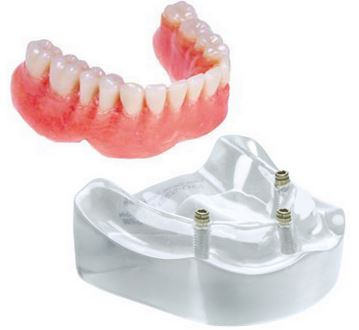MULTIPLE APPOINTMENTS ARE NEEDED
THE DENTIST WILL PROVIDE TREATMENT PLAN.
The cost is based on a single implant.
No mouth is the same, no tooth is the same.
Despite improvements in dental care, millions of Americans
suffer tooth loss — mostly due to tooth decay, periodontal disease, or
injury. For many years, the only treatment options available for people with
missing teeth were bridges and dentures. But, today, dental implants are
available.
What are dental implants?
A dental implant is a surgical component that interfaces
with the bone of the jaw or skull to support a dental prosthesis, such as a
crown, bridge or denture. The basis for modern dental implants is a biologic
process called osseointegration, in which materials such as titanium form an
intimate bond to bone.
What is involved in getting a dental implant?
The first step in the dental implant process is the development of an
individualized treatment plan. The plan addresses your specific needs and is
prepared by a team of professionals who are specially trained and experienced
in oral surgery and restorative dentistry. This team approach provides
coordinated care based on the implant option that is best for you.
Success or failure of implants depends on the health of the person receiving
the treatment, drugs which affect the chances of Osseo integration, and the
health of the tissues in the mouth. The amount of stress that will be put on
the implant and fixture during normal function is also evaluated. Planning the
position and number of implants is key to the long-term health of the
prosthetic since bio mechanical forces created during chewing can be
significant. The prerequisites for long-term success of Osseo integrated dental
implants are healthy bone and gingiva. Since both can atrophy after tooth
extraction, pre-prosthetic procedures such as sinus lifts or gingival grafts
are sometimes required to recreate ideal bone and gingiva.
The final prosthetic can be either fixed, where a person cannot remove the
denture or teeth from their mouth, or removable, where they can remove the
prosthetic. In each case an abutment is attached to the implant fixture. Where
the prosthetic is fixed, the crown, bridge or denture is fixed to the abutment
with dental cement. Where the prosthetic is removable, a corresponding adapter
is placed in the prosthetic so that the two pieces can be secured together.
Your dentist also will match the color of the new teeth to your natural teeth.
Because the implant is secured within the jawbone, the replacement teeth look,
feel, and function just like your own natural teeth.
What are the advantages of dental implants?
Improved appearance. Dental implants look and feel like
your own teeth. And because they are designed to fuse with bone, they become
permanent.
Improved speech. With poor-fitting dentures, the teeth
can slip within the mouth causing you to mumble or slur your words. Dental
implants allow you to speak without the worry that teeth might slip.
Improved comfort. Because they become part of you,
implants eliminate the discomfort of removable dentures.
Easier eating. Sliding dentures can make chewing
difficult. Dental implants function like your own teeth, allowing you to eat
your favorite foods with confidence and without pain.
Improved self-esteem. Dental implants can give you back your
smile and help you feel better about yourself.
Improved oral health. Dental implants don’t require
reducing other teeth, as a tooth-supported bridge does. Because nearby teeth
are not altered to support the implant, more of your own teeth are left intact,
improving long-term oral health. Individual implants also allow easier access
between teeth, improving oral hygiene.
Durability. Implants are very durable and will last many
years. With good care, many implants last a lifetime.
Improved speech. With poor-fitting dentures, the teeth
can slip within the mouth causing you to mumble or slur your words. Dental
implants allow you to speak without the worry that teeth might slip.
Improved comfort. Because they become part of you, implants
eliminate the discomfort of removable dentures.
How do i care for dental implants?
Dental implants require the same care as real teeth, including brushing,
flossing, rinsing with an antibacterial mouthwash, and regular dental
check-ups.
How painful are dental implants
Most people who have received dental implants say that there is very little
discomfort involved in the procedure. Local anesthesia can be used during the
procedure, and most patients report that implants involve less pain than a
tooth extraction.
After the dental implant, mild soreness can be treated with over-the-counter
pain medication.




